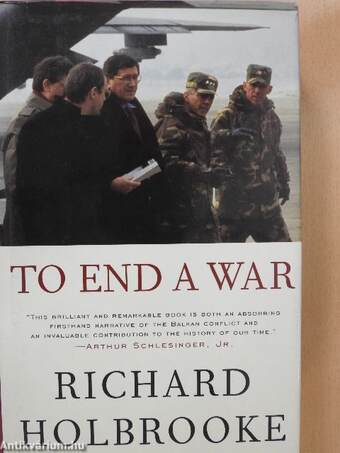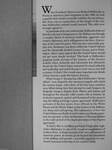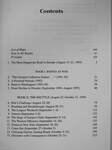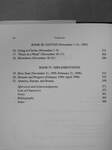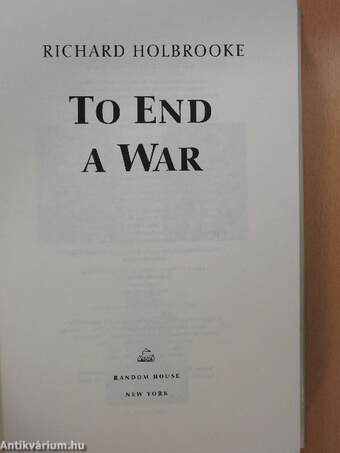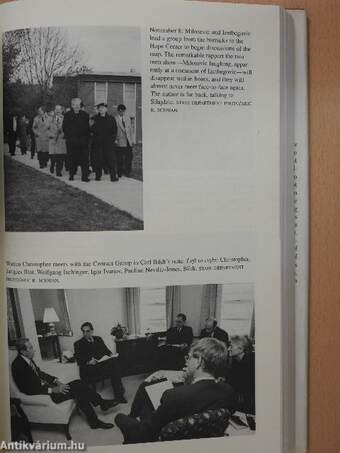1.068.030
kiadvánnyal nyújtjuk Magyarország legnagyobb antikvár könyv-kínálatát

VISSZA
A TETEJÉRE
JAVASLATOKÉszre-
vételek
To end a war (dedikált példány)
| Kiadó: | Random Hause |
|---|---|
| Kiadás helye: | New York |
| Kiadás éve: | |
| Kötés típusa: | Fűzött kemény papírkötés |
| Oldalszám: | 424 oldal |
| Sorozatcím: | |
| Kötetszám: | |
| Nyelv: | Angol |
| Méret: | 24 cm x 16 cm |
| ISBN: | 0-375-50057-x |
| Megjegyzés: | Richard Holbrooke szerző által dedikált példány. Fekete-fehér fotókkal illusztrálva. |
naponta értesítjük a beérkező friss
kiadványokról
naponta értesítjük a beérkező friss
kiadványokról
Fülszöveg
ADVANCE PRAISE FOR
TO END A WAR
"This is more than a book about Bosnia. There will be more Bosnias in our future, and To End a War offers basic guidance about the uses of American power in a dangerous world." _ T
—Arthur Schlesinger, Jr.
"Whether one agrees with him or not on Bosnia, Richard Holbrooke's book is must reading."
—Henry Kissinger
"What Richard Holbrooke has given us in this impressive diplomatic memoir is a vivid and well-written account of the heroic efforts put forward by the author himself and the small team he headed to spare the troubled Balkan region further bloodshed and horror, and to bring the endangered peoples of Bosnia hope, security, and normalcy
—George r. Kennan
"A real-life diplomatic thriller: the inside story of how peace came to Bosnia. An indispensable guide for future peacemakers."
—Leslie H. Gelb
"Written with sagacity and wisdom, To End a JVar tells us about politics in the Balkans and in Washington, about our European allies, and... Tovább
Fülszöveg
ADVANCE PRAISE FOR
TO END A WAR
"This is more than a book about Bosnia. There will be more Bosnias in our future, and To End a War offers basic guidance about the uses of American power in a dangerous world." _ T
—Arthur Schlesinger, Jr.
"Whether one agrees with him or not on Bosnia, Richard Holbrooke's book is must reading."
—Henry Kissinger
"What Richard Holbrooke has given us in this impressive diplomatic memoir is a vivid and well-written account of the heroic efforts put forward by the author himself and the small team he headed to spare the troubled Balkan region further bloodshed and horror, and to bring the endangered peoples of Bosnia hope, security, and normalcy
—George r. Kennan
"A real-life diplomatic thriller: the inside story of how peace came to Bosnia. An indispensable guide for future peacemakers."
—Leslie H. Gelb
"Written with sagacity and wisdom, To End a JVar tells us about politics in the Balkans and in Washington, about our European allies, and about the intricacies of diplomatic negotiations."
—Fritz Stern
"A riveting, unputdownable account of how Holbrooke and his team cajoled the leaders of the various factions in Bosnia into signing a peace accord. This is not a book about dry policy prescriptions or march-along history. It is an adventure involving physical danger, moral quandaries, psychological gamesmanship, and high drama. Richard Holbrooke is a spirited, generous writer and a master storyteller."
—Lesley STAHL
When President Clinton sent Richard Holbrooke to Bosnia as Americas chief negotiator in late 1995, he took a gamble that would eventually redefine his presidency. But there was no saying then, at the height of the war, that Holbrooke's mission would succeed. The odds were strongly against it.
As passionate as he was controversial, Holbrooke believed that the only way to bring peace to the Balkans was through a complex blend of American leadership, aggressive and creative diplomacy, and a willingness to use force, if necessary, in the cause for peace. This was not a universally popular view. Resistance was fierce within the United Nations and the chronically divided Contact Group, and in Washington, where many argued that the United States should not get more deeply involved. This book is Holbrookes gripping inside account of his mission, of the decisive months when, belatedly and reluctantly but ultimately decisively, the United States reasserted its moral authority and leadership and ended Europe's worst war in over half a century. To End a War reveals many important new details of how America made this historic decision.
What George F. Kennan has called Holbrooke's "heroic efforts" were shaped by the enormous tragedy with which the mission began, when three of his four team members were killed during their first attempt to reach Sarajevo. In Belgrade, Sarajevo, Zagreb, Paris, Athens, and Ankara, and throughout the dramatic roller-coaster ride at Dayton, he tirelessly imposed, cajoled, and threatened in the quest to stop the killing and forge a peace agreement. Holbrooke's portraits of the key actors, from officials in the White House and the Elysée Palace to the leaders in the Balkans, are sharp and unforgiving. His explanation of how the United States was finally forced to intervene breaks important new ground, as does his discussion of the near disaster in the early period of the implementation of the Dayton agreement.
To End a War is a brilliant portrayal of high-wire, high-stakes diplomacy in one of the toughest negotiations of modern times. A classic account of the uses and misuses of American power, its lessons go far beyond the boundaries of the Balkans and provide a powerful argument for continued American leadership in the modern world. Vissza
Témakörök
- Idegennyelv > Idegennyelvű könyvek > Angol > Szépirodalom > Regény, novella, elbeszélés
- Idegennyelv > Idegennyelvű könyvek > Angol > Történelem > Európa története > Egyéb
- Idegennyelv > Idegennyelvű könyvek > Angol > Történelem > USA története
- Szépirodalom > Regény, novella, elbeszélés > Az író származása szerint > Amerika > Amerikai Egyesült Államok
- Szépirodalom > Regény, novella, elbeszélés > Tartalom szerint > Politikai regények
- Történelem > Idegennyelvű > Angol
- Történelem > Politika > Külpolitika > Diplomácia
- Szépirodalom > Regény, novella, elbeszélés > Tartalom szerint > Történelmi regények > Legújabb kor > Egyéb
- Történelem > Kontinensek szerint > Amerika, amerikai országok története > Észak-Amerika
- Történelem > Legújabb kor > Globalizálódó világ
- Történelem > Hadtörténet > Hadügy, hadviselés
- Szépirodalom > Regény, novella, elbeszélés > Tartalom szerint > Életrajzi regények > Önéletrajzok, naplók, memoárok
- Szépirodalom > Regény, novella, elbeszélés > Tartalom szerint > Háborús történetek
- Történelem > Kontinensek szerint > Európa, európai országok története > Közép-Európa > Egyéb
- Dedikált, aláírt kiadványok > Idegennyelv > Szerző által > Dedikált kötetek
- Dedikált, aláírt kiadványok > Szépirodalom > Regények, novellák, elbeszélések > Szerző által > Dedikált kötetek
- Dedikált, aláírt kiadványok > Történelem > Hadászat, hadtörténet > Szerző által > Dedikált kötetek
- Dedikált, aláírt kiadványok > Történelem > Világtörténelem > Szerző által > Dedikált kötetek
- Idegennyelv > Dedikált, aláírt kötetek > Szerző által > Dedikált kötetek
- Szépirodalom > Dedikált, aláírt kötetek > Szerző által > Dedikált kötetek
- Történelem > Dedikált, aláírt kötetek > Szerző által > Dedikált kötetek
Richard Holbrooke
Richard Holbrooke műveinek az Antikvarium.hu-n kapható vagy előjegyezhető listáját itt tekintheti meg: Richard Holbrooke könyvek, művekMegvásárolható példányok
Nincs megvásárolható példány
A könyv összes megrendelhető példánya elfogyott. Ha kívánja, előjegyezheti a könyvet, és amint a könyv egy újabb példánya elérhető lesz, értesítjük.



